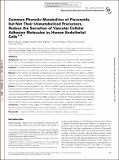Files in this item
Common phenolic metabolites of flavonoids, but not their unmetabolized precursors, reduce the secretion of vascular cellular adhesion molecules by human endothelial cells
Item metadata
| dc.contributor.author | Warner, Emily F | |
| dc.contributor.author | Zhang, Qingzhi | |
| dc.contributor.author | Raheem, K. Saki | |
| dc.contributor.author | O'Hagan, David | |
| dc.contributor.author | O’Connell, Maria A. | |
| dc.contributor.author | Kay, Colin D | |
| dc.date.accessioned | 2016-03-25T13:30:03Z | |
| dc.date.available | 2016-03-25T13:30:03Z | |
| dc.date.issued | 2016-03-01 | |
| dc.identifier | 241583141 | |
| dc.identifier | c228fc38-d246-46bd-bd28-e3a16ed298ec | |
| dc.identifier | 84960417297 | |
| dc.identifier | 000372198200001 | |
| dc.identifier.citation | Warner , E F , Zhang , Q , Raheem , K S , O'Hagan , D , O’Connell , M A & Kay , C D 2016 , ' Common phenolic metabolites of flavonoids, but not their unmetabolized precursors, reduce the secretion of vascular cellular adhesion molecules by human endothelial cells ' , Journal of Nutrition , vol. 146 , no. 3 , pp. 465-473 . https://doi.org/10.3945/jn.115.217943 | en |
| dc.identifier.issn | 0022-3166 | |
| dc.identifier.other | RIS: urn:EE644A6DF21060ADCB239DF8A93C6ED8 | |
| dc.identifier.other | ORCID: /0000-0002-0510-5552/work/68281240 | |
| dc.identifier.uri | https://hdl.handle.net/10023/8489 | |
| dc.description | This study was supported by funding from the UK Biotechnology and Biological Sciences Research Council Diet and Health Research Industry Club (BBSRC-DRINC) (BB/I006028/1). | en |
| dc.description.abstract | Background: Flavonoids have been implicated in the prevention of cardiovascular disease; however, their mechanisms of action have yet to be elucidated, possibly because most previous in vitro studies have used supraphysiological concentrations of unmetabolized flavonoids, overlooking their more bioavailable phenolic metabolites. Objective: We aimed to explore the effects of phenolic metabolites and their precursor flavonoids at physiologically achievable concentrations, in isolation and combination, on soluble vascular cellular adhesion molecule-1 (sVCAM-1). Method: Fourteen phenolic acid metabolites and 6 flavonoids were screened at 1 μM for their relative effects on sVCAM-1 secretion by human umbilical vein endothelial cells stimulated with tumor necrosis factor alpha (TNF-α). The active metabolites were further studied for their response at different concentrations (0.01 μM–100 μM), structure-activity relationships, and effect on vascular cellular adhesion molecule (VCAM)-1 mRNA expression. In addition, the additive activity of the metabolites and flavonoids was investigated by screening 25 unique mixtures at cumulative equimolar concentrations of 1 μM. Results: Of the 20 compounds screened at 1 μM, inhibition of sVCAM-1 secretion was elicited by 4 phenolic metabolites, of which protocatechuic acid (PCA) was the most active (−17.2%, P = 0.05). Investigations into their responses at different concentrations showed that PCA significantly reduced sVCAM-1 15.2–36.5% between 1 and 100 μM, protocatechuic acid-3-sulfate and isovanillic acid reduced sVCAM-1 levels 12.2–54.7% between 10 and 100 μM, and protocatechuic acid-4-sulfate and isovanillic acid-3-glucuronide reduced sVCAM-1 secretion 27.6% and 42.8%, respectively, only at 100 μM. PCA demonstrated the strongest protein response and was therefore explored for its effect on VCAM-1 mRNA, where 78.4% inhibition was observed only after treatment with 100 μM PCA. Mixtures of the metabolites showed no activity toward sVCAM-1, suggesting no additive activity at 1 μM. Conclusions: The present findings suggest that metabolism of flavonoids increases their vascular efficacy, resulting in a diversity of structures of varying bioactivity in human endothelial cells. | |
| dc.format.extent | 9 | |
| dc.format.extent | 1172373 | |
| dc.language.iso | eng | |
| dc.relation.ispartof | Journal of Nutrition | en |
| dc.subject | Polyphenol | en |
| dc.subject | VCAM-1 | en |
| dc.subject | Endothelial | en |
| dc.subject | Inflammation | en |
| dc.subject | Phase II conjugate | en |
| dc.subject | QD Chemistry | en |
| dc.subject | NDAS | en |
| dc.subject | SDG 3 - Good Health and Well-being | en |
| dc.subject.lcc | QD | en |
| dc.title | Common phenolic metabolites of flavonoids, but not their unmetabolized precursors, reduce the secretion of vascular cellular adhesion molecules by human endothelial cells | en |
| dc.type | Journal article | en |
| dc.contributor.sponsor | BBSRC | en |
| dc.contributor.sponsor | BBSRC | en |
| dc.contributor.institution | University of St Andrews. School of Chemistry | en |
| dc.contributor.institution | University of St Andrews. EaSTCHEM | en |
| dc.contributor.institution | University of St Andrews. Biomedical Sciences Research Complex | en |
| dc.identifier.doi | 10.3945/jn.115.217943 | |
| dc.description.status | Peer reviewed | en |
| dc.identifier.grantnumber | BB/H004726/1 | en |
| dc.identifier.grantnumber | BB/I005943/1 | en |
This item appears in the following Collection(s)
Items in the St Andrews Research Repository are protected by copyright, with all rights reserved, unless otherwise indicated.

